Assessment by Dr. Klaus Hofmann
In summary, the new constitution of Tunisia is a solid basis for a promising future of Tunisia. As the President of the National Constitutional Assembly said: "It is not a perfect document, but the product of an agreement."
The new Tunisian Constitution generally provides the usual structure of electoral democracies. It confirms fundamental human rights and follows the principles of separation of powers. In its Preamble and in the chapter about "General Principles" the adopted constitution expresses the "people’s commitment to the principles of Islam and its open and moderate objectives, on sublime human values and the principles of universal human rights".
The constitution describes a presidential democracy, where the President has limited, but important executive powers, which he shares with the "Prime Minister", who is elected by parliament. The President is the only institutional power who can call a direct vote in certain cases. There are no further direct democracy instruments.
The constitution institutionalises a triangle between executive and legislative powers, represented by the offices of the President, the Prime Minister and the Parliament. On the one hand, this triangle could lead to conflicts between the Prime Minister and the President about executive powers, which the Constitution itself already foresees in Article 99. On the other hand, and more importantly, a serious conflict between the President and Parliament might arise, which can weaken the new democratic system and the democratic role of strong political parties. In this context, the only direct democracy instrument in the constitution, the presidential plebiscite, may play a (negative) role.
For a supporter of direct democracy it is sad to realise, that the political rights of people are limited to elections and potential plebiscites. Especially the absence of an obligatory referendum in the case of amendments to the constitution is hard to understand, also because of a missing confirmative vote on the constitution by the people of Tunisia at the beginning of a new area.
Statement by Tarek Bouakaz
“The newly signed constitution is a significant step forward for Tunisia and the whole of North African region, one might even say a success story compared to other countries who are still longing for stability.
Like any other nation in this region Tunisia is a secular country with strong ties to its Islamic identity. Soon after the revolution a debate over the role of Islam in society and government took place, a situation that Algeria has gone through during the 1990s.
Thankfully, Tunisian political leadership did recognise the importance of cooperation and unity, this new constitution may not be ideal or favourable towards direct democracy and people entitlement to direct policy initiatives, but in avoiding an Islamic theocracy, safeguarding freedom of expression and equal rights to women, it is to be commended.
This is certainly a blessing for us here, North Africa has always been united socially and economically at least and the state of democracy and political stability in one nation does affect the union as a whole.” Tarek Bouakaz, member of Democracy International, Algeria.

